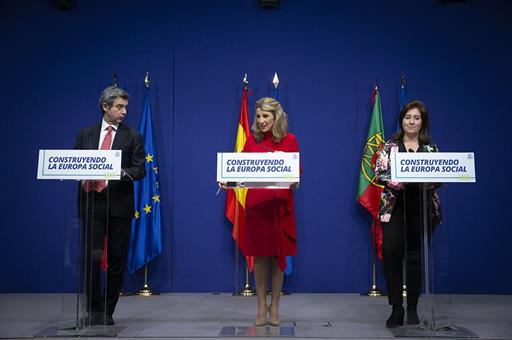Díaz defends a more social response to the war in Ukraine with his Italian and Portuguese counterparts
News - 2022.3.17
The meeting took place at the ministerial headquarters as part of the commemoration of the tenth anniversary of the Social Economy Law, organised by the Spanish Social Economy Business Confederation (CEPES) at the Reina Sofía Museum in Madrid.
"We have one conviction: that now that we are suffering from the war in Ukraine, social Europe makes more sense than ever. The three countries are working to address comprehensive solutions and this perspective is held within the European Union," said the Second Vice-President of the Government.
"More social Europe than ever", was the formula put forward by Díaz, who used the meeting to outline joint action plans with the Italian and Portuguese Ministries of Labour. "Let there be no temptation to return to the rules that caused suffering in Europe. Today we need to protect the productive fabric, employment and wages. The effects of war can bring imbalances in all three countries and we have to work to mitigate those effects. According to Díaz, this crisis "cannot exacerbate the inequalities we already have".
"We have to fight for measures to jointly lower the price of energy, and we are working on this quickly and urgently" from the government, said Díaz, who referred to the fact that "this social Europe must place the value of human rights at the centre to contribute to alleviating the humanitarian crisis".
In addition, the Second Vice-President of the Government called for the defence of gender equality in all the measures adopted, among which she highlighted the activation of the European Social Alert Mechanism, the reformulation of the SURE initiative and the European directive on Minimum Wages. "We cannot emerge poorer from this situation caused by Putin's war," said Díaz, who ended her speech with a call for "peace and an end to the war".
Social cohesion
The Italian Minister for Work, Andrea Orlando, highlighted the importance of the Social Economy, even in the current context of war. "The social economy agenda is even more topical given the worsening of the crisis caused by the war and requires common responses, including in the budgetary field," said Orlando, who also referred to the importance of the European Social Pillar. "A Europe where economic rules are discussed first and the social consequences follow cannot function. Europe does not work if we only discuss economic rules. We need to discuss common rules, seeking social cohesion and a common agenda to cope with this crisis".
For her part, the Portuguese minister Ana Mendes also referred to the joint agenda of work on the Social Economy, "which must be at the heart of the European economic recovery" and to the importance of this model, as well as to its capacity for "joint united mobilisation, which is what we need at this time".
Mendes recalled the commitments of the Porto Summit, which express the common European response to the challenges of the crisis, and alluded to the "social commitment around European values: a collective and solidarity-based response in terms of energy, food security and the humanitarian challenge of refugees during this war".
Tenth Anniversary of the Social Economy Law
Mendes and Orlando also took part in the commemorative event of the tenth anniversary of Law 5/2011 on Social Economy, which was held at the Reina Sofia Museum and was supported, among others, by the French Secretary of State for Social Economy, Olivia Grégorie, with her intervention via telematic means.
The event, organised by the Spanish Social Economy Business Confederation (CEPES), highlighted the value of this law as a clear reference for the growth and development of the sector.
"This regulation, a pioneer in Europe, provided the Social Economy with organisation, institutional recognition and greater legal security, and also recognised the historical trajectory of a whole movement of people who, in association and with mutual aid, sought a way of generating their own employment, their own company", explained the Vice-President of the Government, who was accompanied at the event by the Secretary of State for Employment, Joaquín Pérez Rey, and the Director General for Self-Employment, the Social Economy and Corporate Social Responsibility, Maravillas Espín.
Social Economy reference
The progressive implementation of this production model over the last decade, which was praised by the European authorities present at the event, has led to the sector having more than 43,000 companies and Spain being considered an international benchmark in this field. The Social Economy currently accounts for 10% of GDP, which translates into 2.3 million direct and indirect jobs.
"The progress of the Social Economy is a guarantee of sustainable progress attached to the territory, which eliminates inequalities and generates wealth and opportunities for everyone equally", stressed Vice-President Díaz, who wanted to reiterate the strength and resilience of the sector during the pandemic, which registered fewer job losses.
Non official translation





